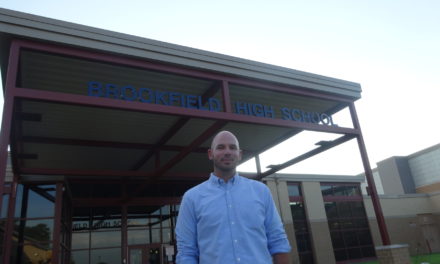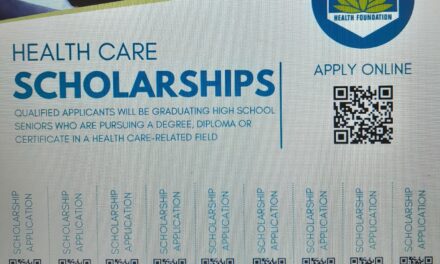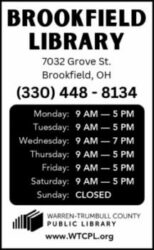
Ohio Treasurer Robert Sprague looks over the shoulder of Brookfield High School student C.J. Campana. Nevon Hofman is at left.
Ohio Treasurer Robert Sprague promoted National Financial Literacy Month with a visit to Brookfield High School April 25 to learn how the district implements financial literacy concepts.
Sprague talked with students about what they are learning in class, observed a class in which they talked about investing, and heard how Junior Achievement of Eastern Ohio helps schools meet their obligations under Senate Bill 1 of 2021, which requires half a year of financial literacy instruction to freshmen.
At Brookfield, financial literacy concepts are revisited in junior American government class.
Students learn about writing checks, the difference between credit and debit cards, building credit, calculating taxes, mortgages and home buying, car buying, leases versus buying, savings, foreign currency and comparing banks, said financial literacy teacher Gerrod Hrusovsky.
“The main idea that we’re trying to do is create real-world situations within the classroom that’s gonna directly end up being something that they’ll use in their future lives, or even currently,” he said.

Ohio Treasurer Robert Sprague, left, listens to Brookfield High School freshman David DeJoy. Principal Megan Marino also is shown.
Junior Achievement supplies the curriculum and Junior Achievement of Eastern Ohio President Michele Merkel noted she met with Brookfield school officials over the summer to talk about implementation.
“Everything that I’ve learned so far I feel like will be very helpful for my future,” said freshman David DeJoy.
Freshman Brooke Montgomery said she appreciated the instruction on foreign currency because she plans to someday travel out of the country.
“We did a project about banks and I think that shows you the importance of picking a bank that would help you and benefit you based on what you do,” said freshman Gianni Kolat.
Hrusovsky said there often is a “lack of skills” among incoming students when it comes to financial literacy, even with something as simple as writing a signature, which is required to open a bank account, buy a car, write a check or take out a loan.
“We want to help them excel in life,” Hrusovsky said. “I think this is an important step that we need to do in order to make that happen.”
Sprague stressed that students have to know the negative aspects of financial transactions, such as that losses can result from investing in stocks, and that credit card companies charge high interest rates if you carry a balance.
“You gotta be careful, you gotta be smart, you gotta be wise,” Sprague said. “I think just as important as what benefits you is you gotta be aware of how people are trying to take advantage of you.”
Sprague complimented Hrusovsky and district officials on how they are teaching financial literacy.
“You can apply this financial literacy piece now, but even more so when you graduate, when you end up getting a job,” Sprague said. “You’re gonna look back on this class and you probably won’t even realize some of the skills that you have that other people don’t because you have some financial literacy curriculum. It’s one of those things you learn in high school and it’s directly applicable to life.”









